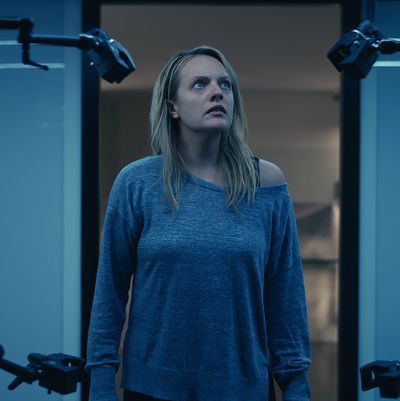
There’s an expression Elisabeth Moss makes that’s right between a grimace and a grin, a baring of teeth that has the rough shape of something friendly without being friendly at all. What’s so unsettling about it is that it manages to appear involuntary — the result of a facial spasm rather than any conscious choice, a signal of inner turmoil making itself visible on the outside, stress causing a body to slip control in all sorts of minute ways. It’s a look that Moss has had plenty of opportunities to deploy over the last few years — while having a freak-out vacationing with a best frenemy in Queen of Earth, or carving up her own face with a pair of scissors as a Tethered terror in Us. Moss has established herself as an empress of the onscreen breakdown, our lady of ruined eye makeup, and that sneer-smile is one of the most powerful tools in her arsenal. The performance she gives as Cecilia Kass, a traumatized survivor of an abusive marriage in The Invisible Man, feels like it was built around it.
The story behind this incarnation of The Invisible Man is as 2020 as the movie’s Me Too inflections. Four years ago, Johnny Depp was cast to play a riff on the H.G. Wells creation as part of Universal Pictures’ doomed efforts to leverage its library of classic movie monsters into a tentpole franchise. But dreams of a Dark Universe died with the Tom Cruise–led 2017 disaster The Mummy, leading the studio to cut its losses and let horror magnate Jason Blum take a whack at a stand-alone reboot for a fraction of the budget. Whatever superhero-but-make-it-goth take on the concept execs might have originally had in mind, it’s safe to say that this unexpected result, written and directed by Saw alum Leigh Whannell, is wildly more interesting. The Invisible Man is not as smart as it could have been, but the concept is ingenious even if the execution gets slapdash. And with Moss at the center, it doesn’t matter all that much — she sells what’s approached as B-movie material with the unwavering dedication of someone starring in a prestige biopic.
Her character, Cecilia, is married to Adrian Griffin (Oliver Jackson-Cohen), a pioneer in the field of optics, whose work is conducted on the lower floor of the chilly modern mansion the couple shares. Or did — the film begins with Cecilia making a suspenseful escape in the middle of the night, scaling the fence of the property and finding her way to her sister Alice’s (Harriet Dyer) car. One of Whannell’s best calls is to leave Cecilia’s isolated life under Adrian’s possessive, violent control offscreen, because the details are transmitted more eloquently on Moss’s face than in her character’s halting accounts. They’re there, as well, in Cecilia’s quavering reluctance to leave the suburban house in which she takes refuge — one that belongs to her hunky but resolutely platonic friend James (Aldis Hodge) and his teenage daughter Sydney (Storm Reid). Then Adrian dies by suicide, or at least that’s what Cecilia’s told by his brother Tom (Michael Dorman), who also happens to be his attorney. She doesn’t believe it, doesn’t think he’s capable, and soon enough, we’re given reason to believe she’s right.
A more considered movie might have lingered in that moment of ambiguity, letting us understand its main character’s paranoia and the ways in which PTSD can turn the whole world into an untrustworthy place. But The Invisible Man is in enough of a hurry to get to its set pieces that there’s never really any doubt that an imperceptible presence is menacing Cecilia, starting kitchen fires as soon as she steps away from the stove and pulling the covers off her body at night. These sequences are cleverly conceived, highlighting the vulnerability of the film’s heroine while teasing where its villain might be lurking by leaving stretches of negative space in the frame, or letting the camera linger on seemingly empty hallways and corners. But between a confounding timeline and characters who turn on Cecilia abruptly because the plot needs them to, it’s in connecting these scenes that the film flounders.
Whannell seems a lot more interested in the literal consequences of being haunted by an abuser than the psychological ones, but Moss holds the film together with her deeply committed performance, and in particular with the defeated air that she gives Cecilia, one that’s always there under her recovering cheerfulness or displays of brittle defiance. She understands that this is a film about a woman who’s stopped believing she’ll ever really feel safe again. The Invisible Man is a depiction of gaslighting, sure, as the strange happenings in the house start making everyone around Cecilia doubt her sanity. But it’s also about what it means to have long ago accepted that people don’t look past the shiny surfaces of things. When Cecilia gives one of those half smile, half grimaces, it’s with the resigned expectation that no one will see anything wrong with it. Enduring abuse, and having your pain and fear go unseen, can be its own form of invisibility.


